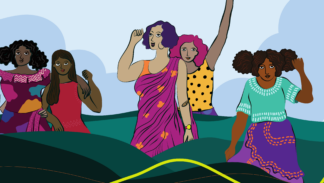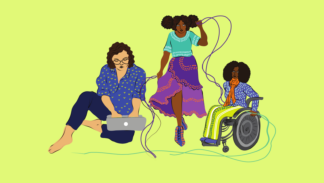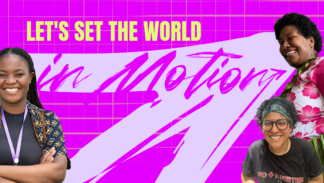The Women’s Revolution in Sudan: We stand in solidarity with feminist activists fighting for their freedom
Military forces have violently cracked down on civilian protesters in Sudan over the past year, killing more than 100 people and injuring over 500 in a recent weekend in June alone. Protesters have been bloodied, burned, gang-raped, and killed, some disfigured and thrown into the Nile. The numbers of dead and injured may be far higher, these figures and accounts reflect only what has been documented.
The protesters, who staged a long-running sit-in at military headquarters, are calling for civilian rule, women’s rights, and an end to the nation’s civil wars. Prior demonstrations in April forced dictator Omar al-Bashir from power. The military has since taken control, bringing in RSF, a militia whose leadership was responsible for the Darfur genocide, to terrorize protesters in the capital, Khartoum. Recently, the government shut off Internet connectivity to prevent organizing and information exchange in and out of Sudan, leaving those in the country often in the dark about what is happening.
Women – and their rights – on the frontlines
Women have accounted for an estimated 70 percent of protestors on the streets since December and many have dubbed the protests “the women’s revolution.”
“Women have been in the forefront of the revolution,” a women’s rights activist in Sudan told us. They are raising their voice not just against the military state but against the cultural and family restrictions of a traditional society reinforced by conservative state discourse and behaviors, she said.
Sudan’s “public order” laws regulate women’s everyday actions, including how they dress, cover their hair, and travel in public. Thousands of women have been sentenced to floggings under the laws, with poor and minority women particularly affected. Laws govern women’s rights and bodies in other ways as well. Sudan legalizes child, early, and forced marriage, giving the father the right to marry off his daughter at the age of 10. One in three women are married before the age of 18. Violations of women’s rights are part of a larger context of human rights abuses by the government including: arrests of hundreds of rights activists, protesters, and opposition party members and detention for many weeks without charge, using torture against detainees, and barring activists from travel.
Hala Al-Karib, a Sudanese women’s rights activist, told the Washington Post: women’s “lives have changed fundamentally in recent decades under the restrictive laws.”
“They were criminalized for just being themselves, they were criticized for wearing pants, their lives have been threatened,” Al-Karib said. “The government has an Islamic militant ideology which at its core aims to exclude women from the public space. For 30 years, women in Sudan have fought against this oppression, so it’s no surprise they are out in significant numbers now.”
The women’s rights activist we spoke to echoed this: “Many women said they would rather die in the streets than go home to more repression, this included daughters of high figures in the ruling regime.”
The military government has brutally targeted female protesters. Rape and sexual violence have become explicit government tactics. A top military official directed officers: “Break the girls, because if you break the girls, you break the men.” This is not a new strategy: the military’s prior genocide, war crimes, and crimes against humanity, including rape, have been referred to the International Criminal Court for prosecution.
Since the beginning of the demonstrations, at least 100 women human rights defenders (WHRDs) have been subjected to arbitrary detention, and at least 35 WHRDs remain behind bars, reports WHRD MENA Coalition.
Despite the risks, women have been visual and vocal protesters. In April a stunning image of a young woman in a sea of protesters on top of a car, raising her right hand and leading the crowd in a chant of “revolution” went viral.
The photographer told CNN that the woman on top of the car “was representing all Sudanese women and girls, and she inspired every woman and girl at the sit-in.”
We stand in firm solidarity with Sudanese women and protesters fighting daily to create a more peaceful and just country. The Sudanese government must stop their brutal attacks and violence, and perpetrators must be brought to justice. We call on the US, European Union, United Nations, and African Union to hold the Sudan military and government accountable for their grave human rights violations. We call on all countries to rescind support of the current repressive regime and stop providing money and arms to inflict brutal harm.
How to support:
We asked activists on the ground how those outside of Sudan can help:
- Put pressure on the US administration and Congress to use every possible legal and peaceful means to remove the Transitional Military Council (TMC) and replace it with a civilian government.
- Put pressure on the EU and all European governments to join the efforts to stop the violence in Sudan and bring the perpetrators to justice.
- Call on the African Union to set up a commission of inquiry of human rights violations.
- Support the UN passing a resolution against the Transitional Military Council and forming an independent committee for investigation into human rights abuses.


